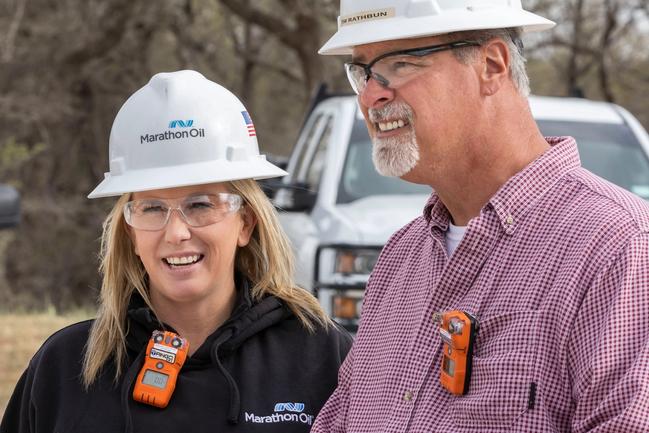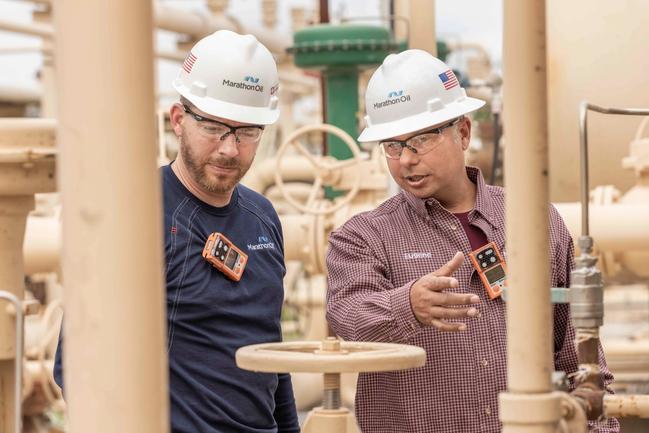

Safety Management
Marathon Oil’s Health, Environment, Safety & Security (HES&S) activities are guided by our Responsible Operations Management System (ROMS), which includes HES&S Standards, Procedures, Life Critical Expectations and HES Beliefs. As the executive owner of the ROMS Safe Work Practices Element, our vice president of HES&S and Corporate Sustainability sets priorities and expectations, tracks progress and is accountable for the results of our safety training and competency programs. Our executive vice president of Operations, who reports to our CEO, is accountable for our global safety performance, with oversight from members of the Health, Environmental, Safety and Corporate Responsibility (HES&CR) Committee of the board of directors.
Marathon Oil’s leadership establishes clear health and safety expectations for our workforce and contractors. Our HES Beliefs define these expectations in the areas of Stop Work Authority, pre-job planning, reporting, sharing lessons learned and open communication.
Our HES Beliefs affirm that all employees and contractors, in the event of a potential safety risk or environmental impact, have the authority to stop the job. Furthermore, we provide and require job-specific HES training for our employees as part of ROMS. Safety-sensitive contractors, who typically receive job-specific training from their employers, also receive an HES orientation from Marathon Oil inclusive of our Life Critical Expectations.
We uphold our safety and health-focused culture by attracting, developing and retaining individuals and partners who share our commitment to operational excellence. Marathon Oil is firmly committed to the safety of all workers at our locations, and we continuously monitor safety performance. We hold ourselves accountable by integrating safety performance into our executive compensation scorecard and by incorporating enterprise-wide safety metrics in our annual incentive plan for all employees and executives.

Stopping the Job
“Stopping a job can be hard – it costs money, impacts production and causes delays. At Marathon Oil, we have full executive and company support to stop the job if we identify anything that could be unsafe. As an example, I was informed that a location had 40% short-service employees. Our team decided to shut the job down until we could increase the percentage of longer-tenured employees on location to perform the job safely. I used our Stop Work Authority and was told by people across the company, including senior leaders, that it was the right choice. For us, there is no question that doing the job safely is the priority.” — Kristin Drain, Oklahoma and Permian Completion Manager
Maintaining a Robust Reporting Culture
Marathon Oil’s robust and transparent reporting culture, coupled with an experienced leadership team that is regularly looking for ways to improve, provides our organization with unwavering support to report all unplanned incidents and near misses that occur in our business. Leadership actively promotes the investigation and learning from any events.
Each week our operations leaders, from the business unit vice presidents to field-level supervisors, meet to openly share and discuss lessons learned. Our entire organization benefits from the timely knowledge gained at these recurring meetings.
Our company-wide focus on safety helped us navigate a challenging year for our industry. While demand for U.S. oil and gas skyrocketed in 2022, labor and supply chain shortages caused staffing instability and many people were working in the industry for the first time.
In response to this instability and to continue to meet our high safety standards, we established corrective action plans for contractors that weren’t meeting our expectations. We also deployed an HES culture survey across the company in early 2022 for the first time. Through this, our leadership and field employees helped us understand the challenges they faced in the field and create action plans to drive improvements. In the third quarter, we resurveyed our field teams to better understand where action plans were working and find additional improvement opportunities. Based on the success of this initiative, we plan to conduct an HES culture survey annually going forward.
We also held safety improvement workshops, meeting directly with our drilling, completion and workover teams in each resource play business unit to understand challenges on the ground and share best practices. From these workshops, we collected improvement opportunities to follow up on. In addition, we implemented bimonthly safety meetings focused on a specific topic, such as hand safety or dropped objects, for employees and contractors across all our resource plays and plan to continue this activity in 2023. We brought back our safety recognition program, which had been scaled down due to the pandemic, to recognize our employees and contractors who set the example for implementing our safety expectations in the field.
We continued our Safety Leadership Engagements (SLEs), in which leaders at all levels of the company actively engage with contractors and field crews working on the ground, helping to convey our safety culture and expectations. In 2022, each of our business unit vice presidents completed in person SLEs.
We also utilize a three-tiered internal audit protocol to routinely verify compliance with our management system elements. We regularly conduct operations level audits (Tier 1), business unit level audits (Tier 2) and corporate level audits (Tier 3). During 2022, we completed a Tier 2 audit of our Equatorial Guinea operations.

Health, Environment and Safety Beliefs Guide Our Actions
“At Marathon Oil, doing things safely is nonnegotiable. Our HES Beliefs are posted in every building and the drive to realize them sets us apart as safety leaders in our industry. These guide what we do day in and day out, letting our team, contractors and partners know that we’re all accountable for our actions.
“As a father of two boys, my safety conversations are centered around making sure everyone on our sites returns home to their loved ones safely each day. Our industry had a challenging start to 2022 with the surge in demand for oil and gas, labor shortages and supply chain disruptions. Through it all, we stuck to our HES Beliefs, had the resources we needed in the field to do the job safely and received unwavering support from leadership. We’re proud of the safety record we’ve achieved, but are always striving to do more. This organization-wide commitment to safety is critical to our business success.” — Dan Stahl, Safety Supervisor, Eagle Ford
Occupational Health
We value a healthy and safe workplace and work to protect the well-being of our employees. ROMS guides our efforts to identify and address key health challenges in our operations. Our exposure assessment process builds upon and aligns exposure risk management with our HES risk assessment process. We identify and rank potential chemical, physical and biological exposure hazards according to risk and then apply industrial hygiene monitoring to control hazards.
In 2022, we hired a third-party consultant to assist with surveying our locations for workplace exposures. We expect this multi-year undertaking, focused on reducing hydrocarbon exposure for our workforce, to be completed by 2024.
Process Safety
Process safety encompasses programs to prevent hydrocarbon releases that have the potential to affect people, property and the environment. We have a robust Operator and Maintenance Technician Qualification Management process whereby skills, knowledge and experience are measured throughout job task assignments and career progression. Our ROMS management system contains the standard requirements and procedures for the administration of this program and houses a formal and all-encompassing training matrix that details the specific training assigned by job function. This matrix and the requirements and procedures are available on-demand for all employees through the ROMS Interface Tool.
Our engineering, operations, maintenance and leadership teams are trained to conduct regular risk assessments that identify and mitigate risks posed by all aspects of operations, including Job Safety Analysis, Job Specific Tasks, Project Risk Assessments, Facility Risk Assessments and Process Hazard Analysis.
We actively monitor process safety performance and investigate incidents and near misses that caused or could have caused adverse impacts to safety, the environment, regulatory compliance, reliability or the security of our assets. We identify, report and investigate incidents and details are recorded in a database that helps us identify trends and follow through on improvements. In 2022, a focus on providing field operations with enhanced tools to identify and report Process Safety Events led to increased awareness and enhanced risk mitigation.
In early 2023, Marathon Oil’s leadership team commissioned a Process Safety Improvement Project and engaged a third-party expert as well as an external advisor. Through the project we reviewed past process safety performance and potential changes to regulatory requirements. The project resulted in 12 recommendations focused on process safety culture, leadership and accountability. While the project is ongoing and expected to be complete by year-end 2023, our teams have already begun making progress on implementing the recommendations. As an example, we have updated our ROMS risk assessment to align with the American Petroleum Institute (API) 754 risk table and have begun participating in process safety industry conferences.
In 2022, we did not experience any Tier 1 (high-consequence) or Tier 2 (medium-consequence) Process Safety Events at our PSM designated facilities in our U.S. resource plays, Marathon EG Production Limited (MEGPL) or Equatorial Guinea LNG Operations, S.A. (EG LNG).
Pipeline Integrity
Marathon Oil develops procedures, installs mechanical safeguards and conducts preventive maintenance and equipment inspections to proactively prevent spills and releases. We continue to utilize control logic for our pipeline systems to better detect leaks in dynamic flow conditions. This helps reduce the probability of recurrence of isolated, high-impact events. We use advanced inspection technologies on our pipelines and conduct low point digs and automated ultrasonic thickness inspections to mitigate the likelihood of spills. We also continue aerial surveillance to detect line leaks, spills and other issues. Since 2015, our pipeline integrity program has included building all new and replacement pipelines using internally coated steel, resulting in a decrease in large spills.
Product Stewardship
We continue to integrate product stewardship principles as part of our safety management system. We work internally and with outside vendors to foster the safe use, handling, transportation, storage, recycling, reuse and disposal of materials, products and wastes. We also provide online Safety Data Sheets with information on health and safety aspects for 100% of our products and make them available at our well sites.
Exclusive of firefighting chemicals and materials containing Teflon (e.g., seals and gaskets), we don’t use any fluorinated-based chemicals (PFAS/PFOA) in our operations.
Safety Leadership Across the Industry
Marathon Oil staff are engaged in numerous American Exploration and Production Council (AXPC) initiatives. AXPC works to educate regulators and policymakers on safe, responsible exploration and production. We participate in programs that share information related to serious injury events with peers to develop better tools and processes for the industry.
How are we doing?
Your opinion matters. Please take a moment to let us know how useful you find the content on this page.
If you’d like to give us your feedback on the entire report, please fill out the complete survey for the 2022 report.



















